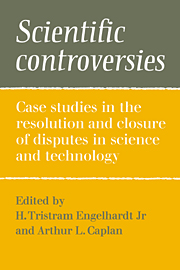 Scientific Controversies
Scientific Controversies Book contents
- Frontmatter
- Contents
- Preface
- List of contributors
- Introduction: Patterns of controversy and closure: the interplay of knowledge, values, and political forces
- PART I THEORETICAL PERSPECTIVES
- 1 Ethical theory and the problem of closure
- 2 Scientific controversy and its termination
- 3 The political anatomy of controversy in the sciences
- 4 Controversies involving science and technology: a theoretical perspective
- 5 Politics, public policy-making, and the process of reaching closure
- 6 The role of experts in scientific controversy
- 7 The continental drift debate
- 8 How history and politics affect closure in biomedical discussions: the example of the Soviet Union
- 9 Scientific disputes over policy
- 10 Controversies and the authority of science
- 11 Post-Skinner and post-Freud: philosophical causes of scientific disagreements
- PART II CONTEMPORARY CASE STUDIES
- PART III CONTROVERSY, CLOSURE, AND THE PUBLIC
- Author index
- Subject index
6 - The role of experts in scientific controversy
Published online by Cambridge University Press: 03 February 2010
- Frontmatter
- Contents
- Preface
- List of contributors
- Introduction: Patterns of controversy and closure: the interplay of knowledge, values, and political forces
- PART I THEORETICAL PERSPECTIVES
- 1 Ethical theory and the problem of closure
- 2 Scientific controversy and its termination
- 3 The political anatomy of controversy in the sciences
- 4 Controversies involving science and technology: a theoretical perspective
- 5 Politics, public policy-making, and the process of reaching closure
- 6 The role of experts in scientific controversy
- 7 The continental drift debate
- 8 How history and politics affect closure in biomedical discussions: the example of the Soviet Union
- 9 Scientific disputes over policy
- 10 Controversies and the authority of science
- 11 Post-Skinner and post-Freud: philosophical causes of scientific disagreements
- PART II CONTEMPORARY CASE STUDIES
- PART III CONTROVERSY, CLOSURE, AND THE PUBLIC
- Author index
- Subject index
Summary
The eugenics movement in the United States between 1905 and 1940 provides a useful case study of the role of “experts” in a scientific controversy with obvious social implications. I have chosen to focus my attention on this topic because it falls most closely within my own area of research interests and is also the one in which my familiarity with the primary source material is the greatest. Throughout this chapter, I will make explicit references to various other case studies that were examined in the course of the Closure Project, thereby hopefully providing a basis for some generalizations about the role that experts play in scientific controversies. By employing a specific historical methodology (Marxism) for the analysis of a detailed case history (eugenics) with respect to a single question (the role of experts), I hope to suggest some ways in which future research on topics such as closure might be carried out.
Let me say at the outset that to me the function of this or any of the other case examples discussed in the Closure Project is to help us arrive at valid sociohistorical explanations for the generation and closure of controversy. My view is that we should seek to understand general causes in history. I appreciate the value of descriptive, “tell-it-like-it-is” narratives, but I think the most important function of the historian is to seek more wide-ranging explanations where possible. At certain points in the investigation of any subject the descriptive material must come first, and I therefore emphasize the value of preparing detailed case histories.
- Type
- Chapter
- Information
- Scientific ControversiesCase Studies in the Resolution and Closure of Disputes in Science and Technology, pp. 169 - 202Publisher: Cambridge University PressPrint publication year: 1987
- 8
- Cited by
